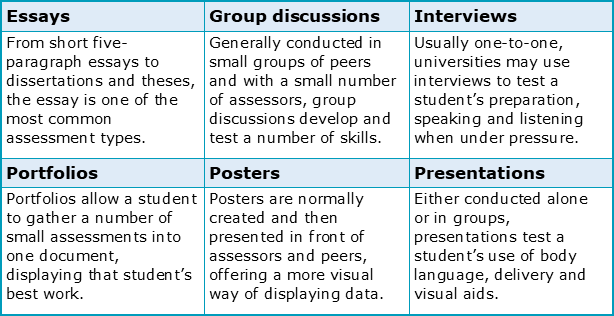What is an assessed academic group discussion?

This is the first of three chapters about Group Discussions. To complete this reader, read each chapter carefully and then unlock and complete our materials to check your understanding.
– Discuss the six most common academic assignments
– Explore group discussions in detail, explaining their purpose and assessment criteria
– Discuss the skills learned through successful completion of group discussions
Chapter 1

Students will be assessed in a variety of ways during their time at university, and each assessment is generally just as important (if not more important) than the last. While essays and exams might be familiar territory to most students, an assessed group discussion may very well be a new and daunting experience. Knowing how to correctly listen to, respond to and structure a successful group discussion can be a challenging task, which is why our academic experts have created this short three-chapter reader. Chapter 1 introduces the basics of academic discussions, Chapter 2 explores the skills that are needed for an effective discussion and Chapter 3 highlights the nine most common pitfalls that students should avoid.
Which academic assignments are most common?
While universities might get creative in the types of assessment that they expect students to complete, there are six common forms of assignment that students should expect and become confident in.

What exactly is a group discussion?
Group discussions are a type of assessment in which a small team of students are required to discuss an arranged topic in front of a small number of assessors. Such discussions typically last between eight and fifteen minutes and are usually conducted in groups of three to six students. To determine the topic of the discussion, students are normally provided with a discussion prompt. This prompt may include images, a number of words and phrases to assist memory, and a specific question to guide the debate, such as the examples below:
‘Why did Brexit happen and how has this affected the EU?’
‘Is the air pollution that one country produces the world’s responsibility?’
‘How can technology assist language learning in the classroom?’
While such prompts may be provided to the students a week or two before the day of assessment, they are normally provided just before the group discussion starts. Students must therefore become familiar with and be able to predict the types of topics that will be expected in their assessed discussion.
Why do university use group discussions?
Group discussions are designed to prepare students for future participation in academic seminar discussions. Out of all the assessment methods, group discussions perhaps demand the most from students and assessors and demonstrate and strengthen a wide variety of useful skills. This academic assignment allows students to show off their presentation and listening skills as well as demonstrate their teamwork, communication, persuasiveness and delivery.

Group discussions also help students to:
- improve confidence
- explore topics in depth
- improve language skills
- strengthen conceptual knowledge
- increase retention of factual knowledge
- develop communication and critical thinking skills
How are group discussions usually assessed?
While assessment criteria will change from university to university, the most common method of assessing a group discussion is to focus on delivery, interaction, listening skills, language use and topic knowledge. Students therefore tend to perform poorly during group discussions if they are nervous of speaking in public, if they lack the knowledge necessary to contribute to the conversation, or if they have a poor command of the language.
Now that you understand the basics of group discussions, it might be a good idea to test your knowledge by unlocking the Chapter 1 Worksheet. Once completed, students may then wish to progress to Chapter 2 where we discuss how body language, delivery strategies and discussion strategies make for effective assessed group discussions.
To reference this reader:
Academic Marker (2022) Group Discussions. Available at: https://academicmarker.com/academic-guidance/assignments/group-discussions/ (Accessed: Date Month Year).
Downloadables
Once you’ve completed all three chapters in this short reader about Group Discussions, you might then wish to download our Chapter Worksheets to check your progress or print for your students. These professional PDF worksheets can be easily accessed for only a few Academic Marks.
Chapter 1 explores the topic: What is an assessed academic group discussion? Our Chapter 1 Worksheet (containing guidance, activities and answer keys) can be accessed here at the click of a button.
Chapter 2 explores the topic: Which skills make for effective group discussions? Our Chapter2 Worksheet (containing guidance, activities and answer keys) can be accessed here at the click of a button.
Chapter 3 explores the topic: What are the nine pitfalls of university discussions? Our Chapter 3 Worksheet (containing guidance, activities and answer keys) can be accessed here at the click of a button.
To save yourself 2 Marks, click on the button below to gain unlimited access to all of our Group Discussions Chapter Worksheets. This All-in-1 Pack includes every chapter, activity and answer key related to this topic in one handy and professional PDF.
Collect Academic Marks
-
100 Marks for joining
-
25 Marks for daily e-learning
-
100-200 for feedback/testimonials
-
100-500 for referring your colleages/friends